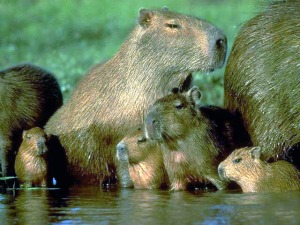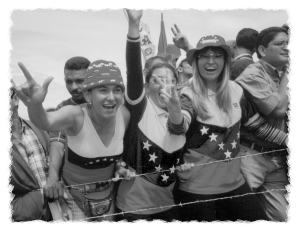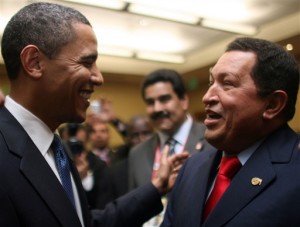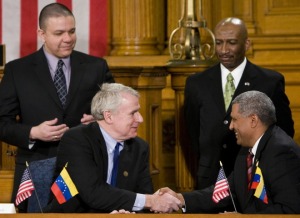Disney’s animated movie “Up!”, featuring the striking landscapes of southeastern Venezuela, has opened in many theaters around the U.S. In an interview to the Associated Press, the film’s director and story supervisor discussed the trip they took to Angel Falls and the tepuis (a table-top mountain) of Venezuela and Brazil during the making of the film. They described it as “the most magnificent trip that most of us would take in our lifetime” and called on tourists to be “respectful of the locations” and not “ruin them ’cause they are really beautiful places.” Watch the trailer featuring Angel Falls below.
Posted in Arts & Culture, Nature & Environment | Leave a Comment »
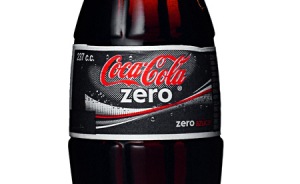 Well, looks like Venezuela has done what many consumer advocacy groups and medical experts have been hoping the US would do for some time.
Well, looks like Venezuela has done what many consumer advocacy groups and medical experts have been hoping the US would do for some time.
One of the many diet soft drinks known to contain potentially carcinogenic ingredients like aspartame and acesulfame potassium has been taken off of Venezuelan store shelves and will no longer be available for purchase. It’s a start health experts say.
Yesterday, the Venezuelan Health Ministry made the announcement that “Coke Zero” would not be sold while health authorities investigate its ingredients for potentially unsafe substances.
Posted in Arts & Culture | Leave a Comment »


Venezuelans can now buy cell phones for the equivalent of just US $13.95, thanks to a new state-run company that put its first 5,000 units on the market yesterday in Caracas.
Eager shoppers snapped up the first bunch, and the AP reports that another 5,000 will be in stores soon.
The tiny phone, dubbed “El Vergatario,” is equipped with a camera, radio, and mp3 player.
The firm that makes them, a joint venture by the governments of Venezuela and China, is known as Vetelca. This is not an isolated effort, but rather, part of a broader plan to promote affordable technology (you may recall the “Bolivarian Computer,” and the adoption of open-source Linux operating systems).
“El Vergatario” is only sold on the domestic market right now, but depending on its success, it could eventually become an export. And because it is literally the cheapest cell phone in the world, it is likely to be quite competitive.
Posted in Arts & Culture, Society & Politics | Tagged cell phone, Chavez, China, economy, gadgets, latin america, news, politics, tech, Technology, telecommunications, venezuela, vergatario | Leave a Comment »
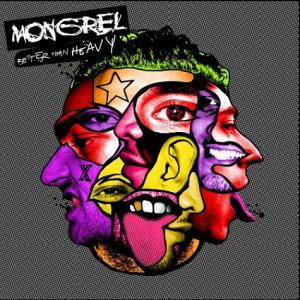
According to Billboard Music, the band Mongrel is “genre smashing”. The supergroup promotes peace and political consciousness in their lyrics.
Comprised of members from several bands, including Reverend & the Makers, Poisonous Poets, Arctic Monkeys, and Babyshambles, Mongrel is set to put some Venezuelan flavor in their tunes.
This month they’ll travel to Venezuela to launch a musical program and give a free show.
Mongrel is dedicated to sharing music and will give away thousands of CDs when they arrive in Caracas later this month. 400,000 copies of their last album “Better than Heavy” were distributed for free throughout Britain.
They’ll also make an appearance on the President Chavez’s weekly television show Aló Presidente. Plans are in the works to do a new album based on Jamaican reggae and Venezuela folk music, hopefully featuring Damian Marley.
Watch this video of their song “The Menace”.
Posted in Arts & Culture | Tagged Alo Presidente, Arctic Monkeys, Babyshambles, Better than Heavy, Britain, British music, caracas, culture, Damian Marley, free music, Hugo Chavez, Jamaica, Mongrel, music, Poisonous Poets, reggae, Reverend and the Makers, United Kindgdom, venezuela, venezuelan music | Leave a Comment »
 Venezuela defeated Colombia yesterday in the South American qualifiers for the 2010 World Cup. The game was played in Cachamay Stadium in Puerto Ordaz, located the eastern state of Bolivar.
Venezuela defeated Colombia yesterday in the South American qualifiers for the 2010 World Cup. The game was played in Cachamay Stadium in Puerto Ordaz, located the eastern state of Bolivar.
Colombia was one player short at the end of the game, due to a yellow card. The Venezuelan team took advantage of their extra man to win the game 2 – 0.
Substitute striker Nicolas Fedor, seen at left, was the first to score. Left-footed midfielder Juan Arango delivered the second goal on a free kick late in the game. Venezuela is currently in 8th place, just behind Colombia.
The vinotinto is keeping the dream alive! Stay tuned as they play Bolivia in June. Read a New York Times article about yesterday’s game.
Posted in Sports, The Region | Tagged 2010 World Cup, athletes, Bolivar, Boliviar, Cachamay Stadium, Colombia, entertainment, football, futbol, Juan Arango, news, Nicolas Fedor, Puerto Ordaz, soccer, South America, Sports, venezuela, venezuelan athletes, world cup | Leave a Comment »

Venezuela is the nation with the 10th-largest amount of biodiversity in the world. Efforts to protect that biodiversity are highlighted in a new study by RAISG, or La Red Amazónica de Información Socioambiental Georreferenciada.
According to the study, Venezuela has the second-highest proportion of its Amazon region protected. The Amazonian basin covers an astounding 3 million square miles in South America, overlapping several different countries and encompassing a population of perhaps 33 million. Venezuela has already protected 71.5% of its share — second only to Ecuador’s 79.7%, and far ahead of Colombia, Brazil, and Peru.
RAISG measured Indigenous territory and other protected lands, which are generally the best conserved. Venezuela has 43 national parks. A respect for nature is enshrined in the constitution of Venezuela under a chapter that guarantees all citizens the right to a safe and healthy environment.
Since the Amazon Rainforest is often called the “lungs” of South America, we can breathe a little easier thanks to Venezuela.
Posted in Nature & Environment, The Region | Tagged Amazon, amazon river, climate change, ecuador, environment, environmentalism, forest, global warming, green, latin america, Nature, news, river, South America, venezuela, Venezuela environment, water | Leave a Comment »
 David Hernández-Palmar, a young Venezuelan man from the Wayuu Indigenous community, will be in New York City this Saturday to help present a documentary at the 30th Annual Native American Film and Video Festival.
David Hernández-Palmar, a young Venezuelan man from the Wayuu Indigenous community, will be in New York City this Saturday to help present a documentary at the 30th Annual Native American Film and Video Festival.
“Owners of the Water: Conflict and Collaboration over Rivers” was created by Hernández-Palmar together with Caimi Waiassé (a Brazilian Xavante man) and U.S. Anthropologist Laura R. Graham. It chronicles an international campaign to protect Rio das Mortes River Basin in Brazil, a vital resource for the Xavante community that was threatened by soya production and related deforestation. The Xavante blocked a national highway to demand the protection of the basin.
To help tell the story of the Xavante’s struggle, Venezuela’s David Hernández-Palmar lent his talents as an up-and-coming documentarian. For more information about this and other films at the Native American Film and Video Festival, click here.
Posted in Arts & Culture | Tagged brazil, cinema, conservation, David Hernández-Palmar, documentary, entertainment, environment, film, film festival, Indigenous, indigenous communities in venezuela, Owners of the water, rio das mortes, venezuela, water, Wayuu, xavante | Leave a Comment »

Venezuela again defeated the US this week in the final game of the second round of the World Baseball Classic. The US made several errors and had some injured players as well. Though the Venezuelans seem to be holding up better, both teams advanced to the finals.
During the rainy game, Venezuela pulled ahead early on, scoring six runs in the second inning. Despite being delayed 70 minutes and playing in less than favorable conditions, la patria querida emerged victorious once again!
Keep watching for the final round, which begins on Saturday, March 21st.
Posted in Sports | Tagged baseball, Miami, Sports, Team USA, United States, Venezuelan baseball, Venezuelan sports, World Baseball Classic | Leave a Comment »
